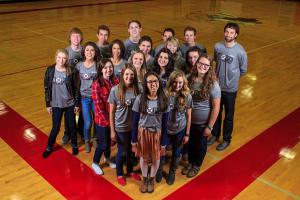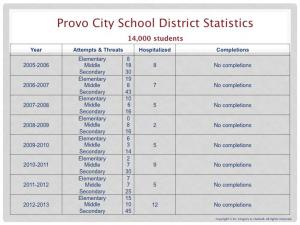Non-Profit has Great Record of Saving Children From Suicide
Suicide is the Leading Cause of Death Among Youth Ages 10-19
"Dr. Hudnall’s is a proven program with HOPE Squads in the schools. He’s a huge hero in my eyes."
PROVO, UT, UNITED STATES, September 3, 2015 /EINPresswire.com/ -- An average of 501 Utahns die from suicide and 3,968 Utahns attempt suicide each year. In 2013, suicide surpassed unintentional injuries to become the leading cause of death among youth ages 10-19 in Utah. On average, 37 youth in Utah die from suicide and 942 are injured in a suicide attempt each year.— Steve Eliason, Utah House of Rep. District 45
One man is on a quest to change that statistic by spreading a message of HOPE. Your generous donation could help save a life. Hope4Utah, a non-profit whose mission is to reduce and eliminate deaths in Utah’s schools, is raising funds for their peer-to-peer groups they call “Hope Squads.” You can donate to the crowdfunding campaign here: http://www.gofundme.com/Hope4Utah
Hope4Utah is trying to raise funds to support their Hope Squads. Currently, each squad has to raise money for their activities, events, and t-shirts. The goal is to raise enough money to increase the number of Hope Squads. The funds will also be used to improve the training and effectiveness of team members.
HOPE Squads are the eyes and ears of your school. They are comprised of students who are trained to watch for at-risk students–provide friendship, identify warning signs, and seek help from adults. HOPE4UTAH works with school advisors to train students who have been identified by their classmates as trustworthy peers to serve as HOPE Squad members. Through evidence-based training modules, HOPE Squad members are empowered to seek help and save a life.
HOPE Squad members are NOT taught to act as counselors, but rather, are educated on how to recognize signs of suicide contemplation, and how to appropriately and respectfully report this to an adult. Once invited to be HOPE Squad members, students willing to go through the training must get a permission form signed by their parents. After completing their training, HOPE Squad members host a parents’ night where they teach their parents and family members about what it means to be a HOPE Squad member.
Why Hope Squads:
HOPE4UTAH has seen much success through their evidence-based peer-to-peer program. Students have identified their school’s HOPE Squads as a source of trust and comfort. In 9 years, 34 HOPE Squads have been formed in the Provo City School District, and over 250 students have been referred for help. HOPE Squads aim to:
• Enhance the health and safety measures already in place at a school
• Educate students on how to recognize warning signs of suicide
• Educate students how to respectfully reports potential suicide behavior
• Train students how to interact with, watch, and support fellow students/friends who may be struggling
• Implement evidence-based strategies through HOPE Squad training programs
• Reduce suicide attempts
About Dr. Gregory A. Hudnall:
Dr. Gregory A. Hudnall is a former high school principal, student service director, and associate superintendent with the Provo City School District. He has been involved with suicide prevention for the past twenty years and has personally been involved with over twenty-five suicides as a first responder or consultant.
Dr. Hudnall has years of personal experience in working with suicide prevention. He has spent the last fifteen years as the executive director of a community crisis team responding to suicides, he spent four years working with Orem Community Hospital emergency room as a therapist and is in his 16th year as chairman of the Utah Suicide Prevention Conference in partnership with Brigham Young University.
Dr. Hudnall was invited to testify before the United States Surgeon General on suicide in Utah and in 2013 was invited by the U.S. Department of Health and Human Services to present in Washington D.C. on the Circles4HOPE community mental health model at the “Dialogue on Behavior Health and Community Resilience in LDS Communities.”
For media interview requests or questions, contact:
Rodney Fife
Ironrod Media
PR@Ironrodmedia.com
(385) 223 8975
Rodney Fife
Ironrod Media
385 223 8975
email us here



